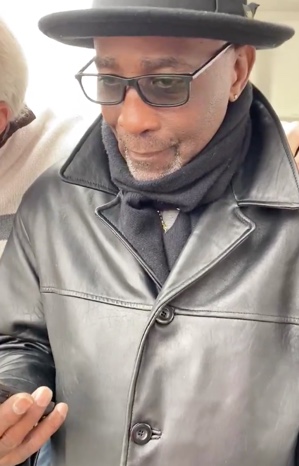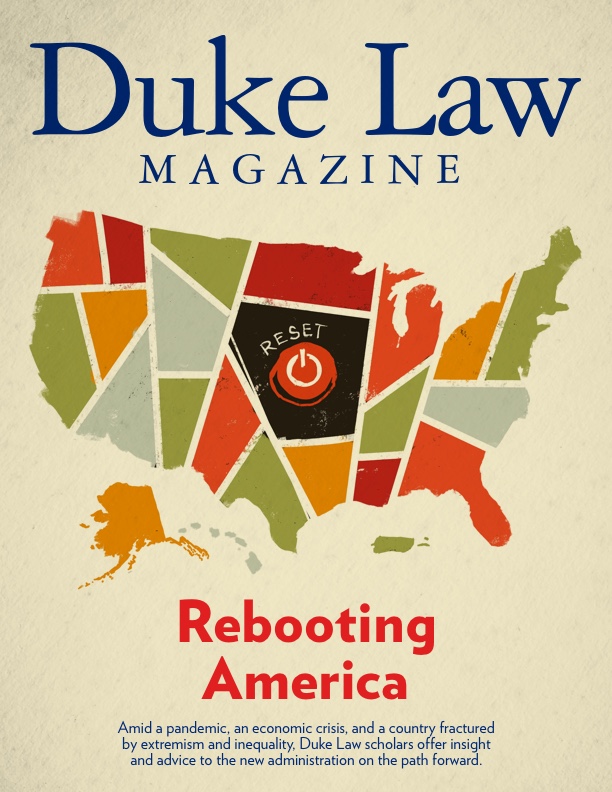
Wrongful Convictions Clinic secures exoneration, pardon of innocence for Ronnie Long
Long, the Wrongful Convictions Clinic’s ninth exoneree, was released in August after 44 years in prison and was granted a pardon in December.
Ronnie Long, a client of the Wrongful Convictions Clinic and its ninth exoneree, was granted a pardon of innocence on Dec. 17, 2020, four months after the clinic secured his release. Long, now 65, spent 44 years in North Carolina prisons for a rape conviction that was not supported by evidence from the crime scene and had proceeded in part due to the suppression of evidence that could have exonerated him. He was released on Aug. 27.

The pardon makes Long eligible for restitution by the state, which allows compensation of $50,000 per year incarcerated, up to $750,000. Four other men exonerated by the clinic have pardon applications pending.
Long’s legal team included Clinical Professor Jamie Lau ’09 as lead attorney, Charles S. Rhyne Clinical Professor of Law Theresa Newman ’88, and John S. Bradway Professor of the Practice of Law James E. Coleman, Jr., the co-director, with Newman, of the clinic. Since the clinic took the case in 2015 numerous Duke Law students have worked on it, including Arnaud Attias LLM ’16, Ace Factor ’17, Ben Freeman ’17, Emily Harrington ’17, Shoshana Silverstein ’20, Emma Wade ’20, and Nicole Wittstein ’20.
Lau believes public pressure and national media attention — Long’s story was featured on CBS This Morning in July — combined with the level of egregious misconduct by law enforcement during the trial led to Gov. Roy Cooper’s relatively speedy pardon, among the first he has issued.
“It speaks to the magnitude of injustice in Ronnie’s case,” Lau said. “It was a wonderful Christmas present from the governor to officially recognize his innocence.” Long said he will use his restitution to buy a home and a proper headstone for his mother, who died less than two months before her son was exonerated. His father died over a decade ago.
Long, who is Black, was convicted by an all-white jury on Oct. 1, 1976, for the rape of a white woman in Concord, N.C. No physical evidence tied Long to the rape and burglary, and the prosecution’s main piece of evidence — the victim’s identification of Long weeks after the attack — did not match her original description of the assailant as a “yellow or really light-skinned Black male.”
Related: Lau explains the pardon process
Numerous pieces of forensic evidence that could have helped exonerate Long, including 43 fingerprints that did not match his that police had collected from the crime scene, were tested by the State Bureau of Investigation but not disclosed, and officers with the Concord Police Department gave false testimony about the evidence at trial. In addition, a rape kit conducted by a hospital has never been found.

In a strongly-worded opinion issued Aug. 24, 2020, the U.S. Court of Appeals for the Fourth Circuit ruled 9-6 that Long’s due process rights were violated at his 1976 trial and remanded the case to the district court to decide the question of innocence. That opinion was issued after a rare en banc hearing in May during which the state conceded that evidence was withheld from Long at trial and that officers testified about the evidence in a misleading manner. Due to the COVID-19 pandemic, Lau argued the case on behalf of Long virtually from a conference room at Duke Law.
In the opinion, Fourth Circuit Judge Stephanie Thacker called misconduct by the Concord Police Department so “extreme and continuous” that Long could not have discovered the withheld evidence to support his own defense. The opinion also noted the case was tried before an all-white jury in the racially polarized atmosphere of 1970s small-town North Carolina.
“Forty-four years is an unconscionably long period to wait for justice.”
Fourth Circuit Judge James Wynn in a concurring opinion following an en banc hearing in Ronnie Long’s case
Added Judge James Wynn: “Mr. Long thus faced a steep uphill battle to persuade the jury of his innocence before he ever set foot in the courtroom. And that uphill climb became an impossibly steep — perhaps even vertical — one when one considers the particular crime in this case, an interracial rape.”
Wynn concluded his concurring opinion, “Forty-four years is an unconscionably long period to wait for justice. It is time.”
Two days later, the State of North Carolina filed a motion with the Fourth Circuit to initiate a process leading to Long’s freedom. The state asked the court to immediately issue a mandate in Long’s case and moved immediately in the district court for the entry of a writ vacating his conviction. The following day an elated Long walked out of prison into the arms of his wife, Ashleigh, whom he had met and married while incarcerated. Surrounded by family and friends, he credited Lau for his release and vowed to “enjoy every minute I’ve got left in my life.”
Long asks students to use their education to work for justice
In October, following his release, Long spoke to Duke Law students in a virtual event, urging them to use their knowledge for just causes including criminal justice reform.
“All I ask is that you be positive, sincere, and dedicated to doing what is right,” he said. “I encourage you to hold onto your dreams, to know that you can accomplish whatever you set your heart and your mind to. Believe in yourself and you can make a change. The Duke Wrongful Convictions Clinic did.”
When asked how he survived 44 years inside a system he described as “heinous, toxic, and corrupt,” Long said he drew on the guidance of a superior being and was bolstered by a large community of supporters. That community included legislators, faith leaders, and nearly 40,000 people who had marched, petitioned, and sent letters asking Cooper to commute Long’s sentence, especially in light of the COVID-19 pandemic, which has ravaged prisons nationwide including the one where Long slept in a 32-bed open dormitory.
“My inspiration came from people who believed in my innocence. And I knew that if I had all these people fighting on the outside, I couldn’t help but continue to fight on the inside,” he said.
“I want the students to know they are a major part of my being in my backyard right now. The reason I’m sitting here is because of God, the support, and the Duke Wrongful Convictions Clinic.”
Read also:

